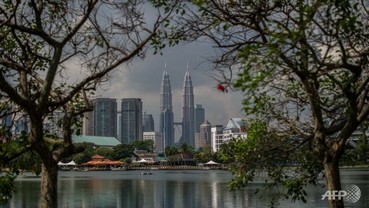Malaysia posts slowest economic growth in over two years

The economy grew 4.7 per cent in the third quarter, the slowest rate since the second quarter of 2013.
KUALA LUMPUR: Malaysia posted its slowest economic growth and smallest current account surplus in over two years on Friday (Nov 13), with third-quarter data offering little relief for a country whose currency has lost 20 per cent of its value this year.
The ringgit is Asia’s worst performer, having been hit hard by weak global prices for Malaysia’s gas and commodity exports, subdued demand from China, and a scandal at debt-ridden state investment firm 1Malaysia Development Berhad (1MDB) that has raised questions over Prime Minister Najib Razak’s leadership and weakened investor sentiment.
Bank Negara Malaysia Governor Zeti Akhtar Aziz told a news conference that the central bank was still pressing 1MDB for answers on some transactions, while refusing to be drawn into the political fray.
“Although the economy is facing a considerable number of shocks, it has remained resilient as reflected by the steady growth performance of our economy,” Zeti said after the release of the data. “The current situation warrants however, a high degree of alert but not alarm.”
The economy grew 4.7 per cent in the third quarter, the slowest rate since the second quarter of 2013, though in line with forecasts from a Reuters poll of economists. It continued a downtrend seen this year, as the GDP expanded by 5.6 per cent in the first quarter and 4.9 per cent in the second quarter.
The current account surplus narrowed to 5.1 billion ringgit (US$1.17 billion) in the third quarter from 7.6 billion ringgit in the previous three months, to also post its lowest level since the second quarter of 2013.
Some analysts saw the rapidly diminishing surplus posing a risk for the ringgit. “The current level of current account surplus is a very low buffer to potential capital outflows. The ringgit still remains vulnerable,” said Michael Wan, analyst at Credit Suisse in Singapore.
Still, Zeti said the ringgit, which showed little reaction to the data trading around 4.3700, is significantly undervalued at the current levels. “It does not reflect the country’s fundamentals as the current account remains in surplus, unemployment remains low and inflation is within Malaysia’s long term average,” she said.
She added: “When there are tensions prevailing the political environment, it will contribute to affecting sentiment. But the point should be made that the external factors were the major factors affecting the currency.”
On the upside, exports jumped in September, rising more than twice the forecast on the back of a weaker ringgit and demand for electrical and electronic products from the US and Europe. Malaysia’s exports and imports were up 3.2 per cent in quarter, the data showed.
Inflation was running at 3 per cent in the third quarter, and is expected to peak in the first quarter of next year before moderating, the central bank said.
1MDB PRESSED FOR ANSWERS
Malaysia, like many other emerging market economies, has lost favour among investors as expectations of an increase in US interest rates mounted over the course of the year.
But the 1MDB scandal has also played a part in net portfolio investment outflows of 24.4 billion ringgit during the third quarter, which took the total outflow for the first nine months of the year to 44.0 billion ringgit.
The central bank had urged criminal prosecution of 1MDB after completing its investigation into the state fund, but attorney general rejected that recommendation.
Bank Negara has also demanded the state fund repatriate funds totalling US$1.83 billion back to Malaysia, but 1MDB says the funds have been utilised. Zeti said the bank will continue to request for information from 1MDB and if not given, the fund’s subsequent requests for approval can be rejected.
“We will not be drawn into any political developments or any political agenda,” Zeti said, adding the bank is focused on ensuring macroeconomic stability and financial stability.
PRIVATE SECTOR REMAINS “ANCHOR OF GROWTH”
Meanwhile, Malaysia’s central bank said the private sector remained “the anchor of growth” for the economy in its third quarter. But while private investment grew by 5.5 per cent from the previous quarter, private consumption saw less impressive growth.
Malaysia rolled out a 6 per cent goods and services tax in April to help reduce its fiscal deficit. That means higher prices, leaving some people holding on to their wallets.
One resident said: “It’s very expensive compared to before. Before this, prices were more affordable in line with the salaries being offered. But now the prices are no longer affordable given the cost of living in Malaysia.”
Another commented: “It has a rippling effect on most of the things. So everybody will use the GST as an excuse to increase the prices.”
But while pressures remain, the central bank said the Malaysian economy is expected to expand by 4.5 to 5.5 per cent this year and 4 to 5 per cent in 2016.




